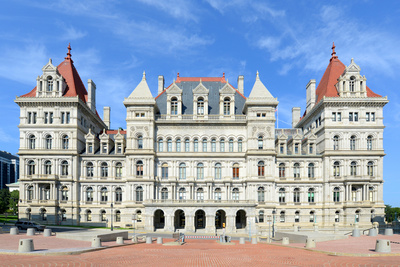March is the last month of the mad scramble that marks the opening of the legislative season, with
several states rushing to wrap up their legislative business before adjournment and others beginning the hard work of crafting a balanced budget.
What's unusual this year is the number of states considering major legislation focused on consumption taxation, whether in the form of levying a new gross receipts tax or expanding the sales tax base. The ultimate political viability of most of these bills remains to be seen, but regardless of their final position, it's notable that so many were considered in the first place.
Taxation of Service Takes Center Stage in West Virginia and Montana
West Virginia
Over the last two months, lawmakers in Charleston have considered six separate proposals all aimed at moving their state toward a more consumption-based model of taxation. From the outset, these proposals were incredibly varied and have been amended significantly as they made their way through the legislative process. Here's a quick sketch of what was on the docket:
- SB 484 — Governor Jim Justice's (D) tax plan originally called for increasing the sales tax rate, expanding the sales tax base to include most professional services, and levying a gross receipts tax. Coming under quick scrutiny from Republicans and the business community, the governor said that he would tone down some of its provisions. The bill has been completely rewritten twice and may end up getting reworked again. In its current form, it expands the sales tax to include personal care and telecommunications services as well as reduces the sales tax rate. The bill cleared the Senate by a vote of 24-10.
- HB 2933 — House Republicans' tax reform plan was originally a bit of a blank slate, calling generally for taxing personal, professional, and contracting services but provided little specificity. It was amended in committee to reduce the sales tax rate and expand the sales tax to a set of professional services, telecommunications, and data processing. The House tabled the proposal on March 31, indicating that it is going to work based off the the Senate plan instead.
- SB 409 — Senate Republicans' tax reform plan first called for eliminating many of the current set of sales tax exemptions (including the exemption for related-party transactions and pharmaceuticals), while also immediately eliminating the personal income tax. It has undergone significant revision since, but in its current form, the bill would increase the sale tax rate, expand the sales tax to include a list of enumerated services (including waste disposal, funeral directing, telecommunications, and software services), expand the sales tax to include groceries, and phase down the personal income tax if the state meets new revenue benchmarks. The bill passed the Senate by a vote of 22-12.
- SB 335 — This bill originally sought to completely change the state's tax code by eliminating the current sales tax, personal income tax, and corporate income tax and replacing them with a new “general consumption tax” that would have taxed sales with only a very few, narrow exemptions. It was amended to take some of the sharp edges off, but it still has not cleared the Finance Committee.
- SJR 8 — Lawmakers filed a constitutional amendment that would repeal the corporate income tax, place a ceiling on the sales tax, and flatten the personal income tax. It was later amended to remove sales tax and corporate income tax provisions entirely. It is currently in the Senate Finance Committee, but is unlikely to move any further.
- SB 683 — This is the least expansive bill up for consideration this year. It increases the sales tax rate, expands the sales tax base to include personal care services and digital goods, and replaces the flat corporate net income tax rate with a tiered system. The bill has not moved since its first introduction and it probably won't again.
Montana
On March 22, the Montana House introduced a bill (
MT HB 640) that has many of the same policy goals as some of the West Virginia bills. It would impose a consumption tax system in one stroke by levying a sales tax that would cover a wide range of goods and services with broad nexus provisions, while repealing the personal and corporate income tax.
From the outset, the bill was revolutionary and its political future was uncertain. Levying a new tax is always a gargantuan political lift, and this bill would almost certainly get slapped with a steep price tag by state fiscal analysts. But there was reason to take this bill seriously. It didn't appear to be another iteration of the same boilerplate consumption tax proposal that pops up annually in certain state legislatures (only to rarely receive a first committee hearing), and it was being sponsored by a member of the relevant fiscal policy committees.
Ultimately, however, the forces of political gravity won out: on March 31 HB 640 failed to beat its legislative cross-over deadline and died without getting hearing in the Taxation Committee or receiving a fiscal note.
Louisiana Governor Unveils Sweeping New Budget Plan
Last week Governor John Bel Edwards (D), facing a
$400 million budget shortfall and the looming sunset of $1 billion in tax revenue, gave a
speech where he provided some of the details of his much-anticipated new tax plan. His
proposal calls for levying a new gross receipts-based Commercial Activity Tax (CAT), expanding the sales tax to include services, cutting the corporate income tax rate, and phasing out the corporate franchise tax over 10 years.
The marquee policy of the speech was the CAT, which is modeled on a tax of the same name from Ohio (Oklahoma and West Virginia have also considered implementing versions of the tax this year). It would levy a 0.35 percent tax on gross receipts for most businesses with revenues in excess of $1.5 million and would impose a minimum tax of between $250 and $750 for businesses that did not meet this threshold. Rather than upending the state's entire business tax system, the governor is pitching this tax as a supplement to the corporate income tax that ensures large companies “pay their fair share.” The tax is also designed to replace the revenue that will be lost when the temporary
one percent sales tax increase expires next year.
We have fewer details about the governor's proposal to expand the sales tax base. All we know at this point is that he hopes to "clean" the sales tax by removing exemptions and exclusions, but whether he will eliminate all of them or just a select few is still unclear.
Business groups have already come out in
firm opposition to Edwards' proposal. For their part,
Republican lawmakers say that they are mostly interested in tackling the spending side of the state's ledger and are not sure if they will get on board with any big tax changes this year.
Oregon Lawmakers to Give Gross Receipts Taxes Another Shot
Despite the failure of
Measure 97 last November, Oregon lawmakers are still considering levying a gross receipts tax to help raise the revenue necessary to close their
billion dollar budget gap.
The Oregonian reports that state Senator Mark Hass (D) (who attempted to gather support for a more reasonable tax alternative to Measure 97 last year) is spearheading an effort to draft legislation that would replace the current corporate income tax with a gross receipts tax.
From the outset, Senator Hass is trying to differentiate his efforts from the failed ballot measure by establishing that his tax would apply to all state businesses, rather than just those with more than $250 million in annual revenue. He also, presumably, will levy his tax at a lower rate than the ballot measure's astronomical 2.5 percent.
Senator Hass has not released a final proposal yet, but he is drawing inspiration from the gross receipts taxes levied in Ohio, Texas, and Washington. Hass has said he's particularly drawn to the Ohio CAT because of what he views as its simplicity.
(It's worth noting that
economists and tax policy experts generally disagree with the senator's perception. They argue that, to the contrary, gross receipts taxes are deceptively complicated and lead to a number of economic distortions.)
While Senator Hass' plan might turn out to be this year's most high-profile Oregon gross receipts tax proposal, two others are currently circulating through the halls of Salem. The first, from the sponsors of Measure 97, is a
two percent tax on companies with revenues over $100 million. This proposal doesn't have a legislative vehicle yet and current indications are that it won't be getting one. The other proposal (
OR HB 2230) would imposes a 0.7 percent tax on businesses with more than $1 million in revenue. This bill was first introduced in January and has languished in its first committee ever since.
Last year's fight over Measure 97 was long, expensive, and acrimonious. Unfortunately, Oregon is facing significant fiscal pressure, so lawmakers may find themselves embroiled in another bitter tax battle sooner than they might like.



